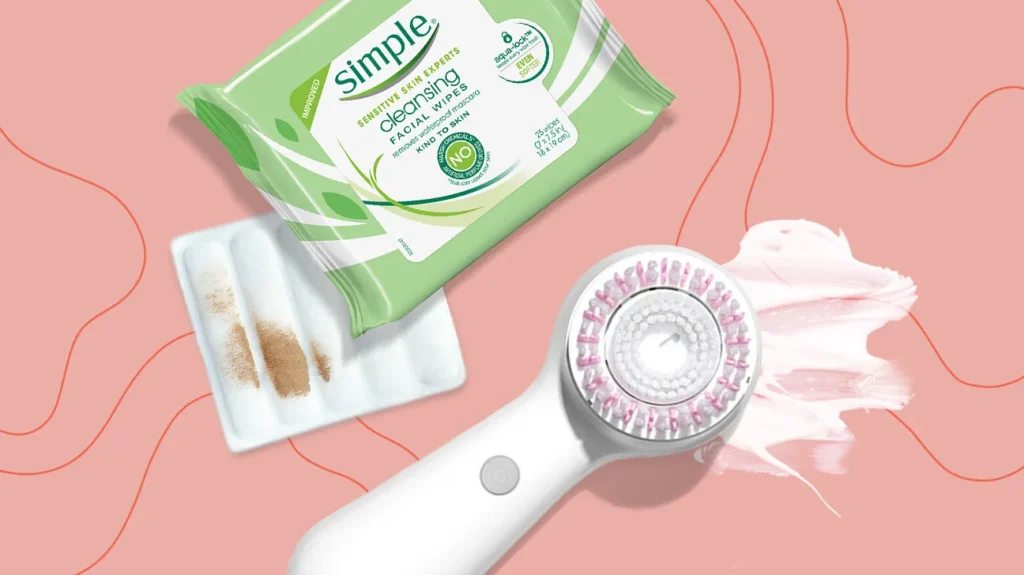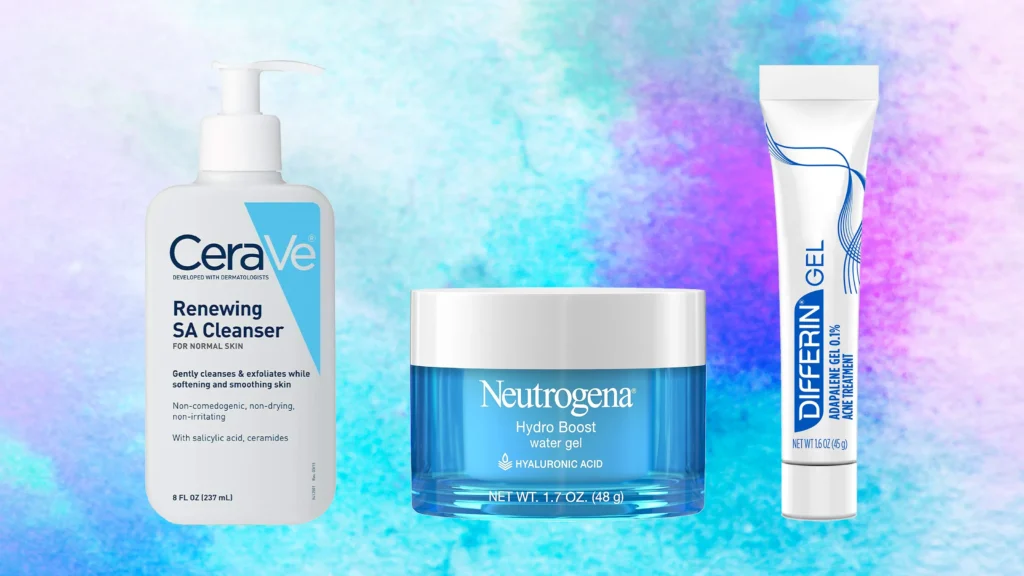Are you wondering How to treat acne naturally? Do you struggle with pesky pimples and persistent acne? You’re not alone. Acne affects millions of people of all ages and can be a frustrating and confidence-shattering experience. While countless over-the-counter treatments and prescription medications are available, many have unwanted side effects and harsh chemicals.
But what if there was a way to treat acne naturally? In this article, we’ll explore some of the best natural remedies for acne, so you can feel confident in your skin without exposing it to harmful substances.
Keep your skin clean.

Keeping your skin clean is one of the most effective ways to prevent and treat acne naturally. Use a mild, natural cleanser to wash your face twice a day. Avoid harsh soaps or scrubs, which can irritate the skin and worsen acne. Instead, look for gentle products that contain natural ingredients like tea tree oil or chamomile.
Use tea tree oil
Tea tree oil is a natural antiseptic that can help kill the bacteria that cause acne. It is also anti-inflammatory, which can help reduce redness and swelling. To use tea tree oil, dilute a few drops in a carrier oil like coconut or jojoba oil and apply it to the affected area. You can add a few drops to your cleanser or moisturizer for an added boost.
Apply apple cider vinegar.
Apple cider vinegar is another natural remedy that can help treat acne. It contains acetic acid, which can help exfoliate the skin and unclog pores. To use apple cider vinegar, dilute it with water in a 1:3 ratio and apply it to the skin with a cotton ball. Leave on for a few minutes before rinsing off with water.
Also Read. The Benefits of Using a Jade Roller: Improve Skin Health and Reduce Inflammation
Use aloe vera
Aloe vera is a natural anti-inflammatory that can help reduce redness and swelling associated with acne. It also contains enzymes that can help exfoliate the skin and unclog pores. To use aloe vera, apply the gel from a fresh aloe vera plant directly to the affected area. Leave on for 10-15 minutes before rinsing off with water.
Try witch hazel
Witch hazel is a natural astringent that can help tighten pores and reduce inflammation. It can also help remove excess oil from the skin, which can contribute to acne. To use witch hazel, apply it to the skin with a cotton ball after cleansing. You can add a few drops to your cleanser or moisturizer for an added boost.
Eat a healthy diet

What you eat can also have an impact on your skin. A diet rich in fruits, vegetables, and whole grains can help provide the nutrients your skin needs to stay healthy. Avoid processed foods, sugary drinks, and foods high in saturated fats, as these can contribute to inflammation and acne.
Stay hydrated
Drinking plenty of water can also help keep your skin healthy and hydrated. Aim for at least eight glasses of water daily, and avoid sugary drinks and alcohol, which can dehydrate the skin.
Get plenty of rest
Getting enough sleep is also important for healthy skin. When you’re sleep-deprived, your body produces more stress hormones, which can contribute to acne. Aim for seven to eight hours of sleep to keep your skin looking its best.
Manage stress
Stress can also contribute to acne by triggering the production of hormones that increase oil production and inflammation. Finding ways to manage stress, such as meditation, yoga, or exercise, can help keep your skin clear.
Use natural makeup
If you wear makeup, choose natural products free from harsh chemicals and fragrances. Look for products that contain natural ingredients like jojoba oil, aloe vera, or chamomile, which can help soothe and protect the skin.
What causes acne on the cheeks?
Acne is a common skin condition when hair follicles become clogged with oil and dead skin cells. While acne can appear on different body parts, including the face, chest, and back, it is particularly common on the cheeks.
Several factors can contribute to the development of acne on the cheeks, including:
Hormonal changes:
Hormonal changes commonly cause acne on the cheeks, especially among teenagers and women during their menstrual cycles. During puberty, the body produces higher levels of androgens, which can cause the sebaceous glands to produce more oil. This excess oil production can lead to clogged pores and the formation of acne.
Genetics:
Genetics also play a role in the development of acne on the cheeks. If your parents or other close family members have a history of acne, you may also be more likely to develop it. This is because certain genes can make your skin more sensitive to the hormones that cause acne.
Poor skincare:

Poor skincare habits, such as not washing your face regularly or using harsh cleansers, can also contribute to acne on the cheeks. When dirt, oil, and dead skin cells accumulate on the skin, they can clog pores and cause acne.
Cosmetics:
Certain cosmetics or skincare products can also contribute to the development of acne on the cheeks. Some products, such as heavy moisturizers and foundations, can clog pores and cause acne. It is important to choose non-comedogenic products that are labeled as being suitable for acne-prone skin.
Diet:
Diet can also play a role in the development of acne on the cheeks. Consuming high amounts of processed and sugary foods can cause an increase in insulin levels, which can stimulate the sebaceous glands to produce more oil. Additionally, consuming dairy products has been linked to an increased risk of acne.
Stress:
Stress can also contribute to the development of acne on the cheeks. When you are stressed, your body produces cortisol, which can cause an increase in oil production and lead to the formation of acne. Also, stress can weaken the immune system, making it more difficult for the body to fight off acne-causing bacteria.
Treatment for acne on the cheeks will depend on the severity of the condition. Mild cases of acne can often be managed with over-the-counter topical treatments containing benzoyl peroxide or salicylic acid. For more severe cases, prescription medications such as antibiotics, retinoids, or hormonal therapies may be necessary.
It is also important to practice good skincare habits, including cleansing the skin twice daily, using non-comedogenic products, and avoiding picking or squeezing pimples, which can worsen inflammation and scarring.
What is the best acne medicine?

Many different acne medicines are available, and the best one for you may depend on the type and severity of your acne, your skin type, and other factors. Here are some of the most commonly used acne medications and how they work:
Benzoyl peroxide:
This is a topical medication that can help to kill the bacteria that cause acne, as well as reduce inflammation. It is available over-the-counter in strengths ranging from 2.5% to 10%. Benzoyl peroxide can dry and irritate the skin, so it’s important to start with a lower strength and gradually work up if needed.
Salicylic acid:
This topical medication can help to exfoliate the skin and unclog pores. It is available over-the-counter in strengths ranging from 0.5% to 2%. Salicylic acid is often used in combination with benzoyl peroxide for maximum effectiveness.
Retinoids:
These are topical or oral medications that are derived from vitamin A. They regulate cell turnover and reduce inflammation, which can help clear up acne. Topical retinoids are available by prescription, while oral retinoids are usually reserved for severe cases of acne.
Antibiotics:
These can be topical or oral medications that help to kill the bacteria that cause acne. They are often used with other acne medications to maximize their effectiveness. Overuse of antibiotics can lead to antibiotic resistance, so they should only be used as directed by a healthcare provider.
Hormonal therapies:
These can be oral medications or topical treatments that help to regulate hormone levels, which can be a factor in some cases of acne. Hormonal therapies are usually only used in women with hormonal acne.
It’s important to note that no “best” acne medication exists, as different medications work best for different people. Additionally, it can take several weeks or even months to see results from acne medication, so it’s important to be patient and stick with your treatment plan. Working with a healthcare provider to develop a personalized acne treatment plan based on your needs and skin type is also a good idea.
Conclusion!
In conclusion, while many over-the-counter and prescription treatments are available for acne, natural remedies can be just as effective and gentler on the skin. Keeping your skin clean, using tea tree oil, applying apple cider vinegar, using aloe vera, trying witch hazel, eating a healthy diet, staying hydrated, getting plenty of rest, managing stress, and using natural makeup are all great ways to naturally prevent and treat acne.
Incorporating these natural remedies into your skincare routine can help keep your skin healthy and clear. However, consulting with a healthcare professional before trying any new skincare routine or treatment is always important.
FAQs!
How can I cure my acne naturally?
Acne can be a frustrating and persistent problem, but several natural remedies can help improve your skin’s health and reduce the occurrence of acne breakouts. Here are some tips to help you cure acne naturally:
Keep your skin clean: Wash your face twice daily with a gentle, natural cleanser to remove excess oil and dirt that can clog pores and cause acne.
Stay hydrated: Drink plenty of water to flush out toxins from your body and keep your skin hydrated.
Eat a healthy diet: Avoid sugary and greasy foods and eat a balanced diet rich in fruits, vegetables, and lean proteins.
Use tea tree oil: Tea tree oil has antimicrobial properties that can help reduce acne-causing bacteria on your skin. Apply a few drops of tea tree oil to a cotton ball and dab it on the affected areas.
Apply honey: Honey has antibacterial properties and can help soothe inflammation. Apply a thin layer of honey to your face and leave it on for 10-15 minutes before rinsing off.
Apply aloe vera: Aloe vera has anti-inflammatory properties and can help reduce the appearance of acne. Apply a thin layer of aloe vera gel to your face and leave it on for 10-15 minutes before rinsing off.
How can I clear up acne fast?
Clearing up acne fast is difficult and may require a combination of natural and medical interventions. However, some ways to potentially speed up the healing process include:
Applying ice to the affected area can help reduce inflammation and swelling.
Using benzoyl peroxide: This over-the-counter medication can help kill acne-causing bacteria and dry out pimples.
Using salicylic acid: This over-the-counter medication can help exfoliate your skin and unclog pores.
Using a clay mask: Applying a clay mask to your face can help absorb excess oil and unclog pores.
Can acne go away by itself?
While some cases of acne may go away independently, it is important to treat acne to prevent scarring and further breakouts. If you have persistent acne, it is recommended to consult a dermatologist for personalized treatment options.
How can I control acne in 2 days?
Unfortunately, controlling acne in just two days is impossible as it takes time for your skin to heal and for the acne to subside. However, using the natural remedies and medical interventions mentioned above can help speed up the healing process and reduce the appearance of acne over time. Consistency with a skincare routine is key to effectively managing and controlling acne.
